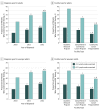Mismatch Repair Deficiency Testing in Patients With Colorectal Cancer and Nonadherence to Testing Guidelines in Young Adults
- PMID: 29121143
- PMCID: PMC5838708
- DOI: 10.1001/jamaoncol.2017.3580
Mismatch Repair Deficiency Testing in Patients With Colorectal Cancer and Nonadherence to Testing Guidelines in Young Adults
Abstract
Importance: Mismatch repair (MMR) deficiency of DNA has been observed in up to 15% of sporadic colorectal cancers (CRCs) and is a characteristic feature of Lynch syndrome, which has a higher incidence in young adults (age, <50 years) with CRC. Mismatch repair deficiency can be due to germline mutations or epigenetic inactivation, affects prognosis and response to systemic therapy, and results in unrepaired repetitive DNA sequences, which increases the risk of multiple malignant tumors.
Objective: To evaluate the utilization of MMR deficiency testing in adults with CRC and analyze nonadherence to long-standing testing guidelines in younger adults using a contemporary national data set to help identify potential risk factors for nonadherence to newly implemented universal testing guidelines.
Design, setting, and participants: Adult (age, <30 to ≥70 years) and, of these, younger adult (<30 to 49 years) patients with invasive colorectal adenocarcinoma diagnosed between 2010 and 2012 and known MMR deficiency testing status were identified using the National Cancer Database. The study was conducted from March 16, 2016, to March 1, 2017.
Exposures: Patient sociodemographic, facility, tumor, and treatment characteristics.
Main outcomes and measures: The primary outcome of interest was receipt of MMR deficiency testing. Multivariable logistic regression was used to identify independent predictors of testing in adult and/or young adult patients.
Results: A total of 152 993 adults with CRC were included in the study (78 579 [51.4%] men; mean [SD] age, 66.9 [13.9] years). Of these patients, only 43 143 (28.2%) underwent MMR deficiency testing; the proportion of patients tested increased between 2010 and 2012 (22.3% vs 33.1%; P<.001). Among 17 218 younger adult patients with CRC, only 7422 (43.1%) underwent MMR deficiency testing; the proportion tested increased between 2010 and 2012 (36.1% vs 48.0%; P < .001). Irrespective of age, higher educational level (OR, 1.38; 95% CI, 1.15-1.66), later diagnosis year (OR, 1.81; 95% CI, 1.65-1.98), early stage disease (OR, 1.24; 95% CI, 1.18-1.30), and number of regional lymph nodes examined (≥12) (OR, 1.44; 95% CI, 1.34-1.55) were independently associated with MMR deficiency testing, whereas older age (OR, 0.31; 95% CI, 0.26-0.37); Medicare (OR, 0.89; 95% CI, 0.84-0.95), Medicaid (OR, 0.83; 95% CI, 0.73-0.93), or uninsured (OR, 0.78; 95% CI, 0.66-0.92) status; nonacademic vs academic/research facility type (OR, 0.44; 95% CI, 0.34-0.56); rectosigmoid or rectal tumor location (OR, 0.76; 95% CI, 0.68-0.86); unknown grade (OR, 0.61; 95% CI, 0.53-0.69); and nonreceipt of definitive surgery (OR, 0.33; 95% CI, 0.30-0.37) were associated with underuse of MMR deficiency testing.
Conclusions and relevance: Despite recent endorsement of universal use of MMR deficiency testing in patients with CRC and well-established guidelines aimed at high-risk populations, overall utilization of testing is poor and significant underuse of testing among young adults persists. Interventions tailored to groups at risk for nonadherence to guidelines may be warranted in the current era of universal testing.
Conflict of interest statement
Figures

Comment in
-
Status of Testing for High-Level Microsatellite Instability/Deficient Mismatch Repair in Colorectal Carcinoma.JAMA Oncol. 2018 Feb 8;4(2):e173574. doi: 10.1001/jamaoncol.2017.3574. Epub 2018 Feb 8. JAMA Oncol. 2018. PMID: 29121141 No abstract available.
Similar articles
-
Tumor testing to identify lynch syndrome in two Australian colorectal cancer cohorts.J Gastroenterol Hepatol. 2017 Feb;32(2):427-438. doi: 10.1111/jgh.13468. J Gastroenterol Hepatol. 2017. PMID: 27273229 Free PMC article.
-
Mismatch repair deficiency in Lynch syndrome-associated colorectal adenomas is more prevalent in older patients.Histopathology. 2016 Aug;69(2):322-8. doi: 10.1111/his.12941. Epub 2016 Mar 21. Histopathology. 2016. PMID: 26826556
-
Prevalence and clinicopathologic/molecular characteristics of mismatch repair-deficient colorectal cancer in the under-50-year-old Japanese population.Surg Today. 2017 Sep;47(9):1135-1146. doi: 10.1007/s00595-017-1486-x. Epub 2017 Mar 3. Surg Today. 2017. PMID: 28258479
-
Lynch syndrome and Lynch syndrome mimics: The growing complex landscape of hereditary colon cancer.World J Gastroenterol. 2015 Aug 21;21(31):9253-61. doi: 10.3748/wjg.v21.i31.9253. World J Gastroenterol. 2015. PMID: 26309352 Free PMC article. Review.
-
Connections between constitutional mismatch repair deficiency syndrome and neurofibromatosis type 1.Clin Genet. 2017 Apr;91(4):507-519. doi: 10.1111/cge.12904. Epub 2017 Jan 10. Clin Genet. 2017. PMID: 27779754 Review.
Cited by
-
Metastatic Colorectal Cancers with Mismatch Repair Deficiency Result in Worse Survival Regardless of Peritoneal Metastases.Ann Surg Oncol. 2020 Dec;27(13):5074-5083. doi: 10.1245/s10434-020-08733-x. Epub 2020 Jun 24. Ann Surg Oncol. 2020. PMID: 32583196 Free PMC article.
-
Measuring and Improving Quality of Colonoscopy for Colorectal Cancer Screening.Tech Innov Gastrointest Endosc. 2022;24(3):269-283. doi: 10.1016/j.tige.2021.11.002. Epub 2021 Nov 14. Tech Innov Gastrointest Endosc. 2022. PMID: 36778081 Free PMC article.
-
Association of KRAS mutation with tumor deposit status and overall survival of colorectal cancer.Cancer Causes Control. 2020 Jul;31(7):683-689. doi: 10.1007/s10552-020-01313-0. Epub 2020 May 11. Cancer Causes Control. 2020. PMID: 32394229 Free PMC article.
-
Mismatch Repair Status Correlates with Survival in Young Adults with Metastatic Colorectal Cancer.J Surg Res. 2021 Oct;266:104-112. doi: 10.1016/j.jss.2021.03.040. Epub 2021 May 11. J Surg Res. 2021. PMID: 33989889 Free PMC article.
-
Tumor-independent Detection of Inherited Mismatch Repair Deficiency for the Diagnosis of Lynch Syndrome with High Specificity and Sensitivity.Cancer Res Commun. 2023 Mar 2;3(3):361-370. doi: 10.1158/2767-9764.CRC-22-0384. eCollection 2023 Mar. Cancer Res Commun. 2023. PMID: 36875157 Free PMC article.
References
-
- Siegel RL, Miller KD, Jemal A. Cancer statistics, 2017. CA Cancer J Clin. 2017;67(1):7-30. - PubMed
-
- Vasen HF, Watson P, Mecklin JP, Lynch HT. New clinical criteria for hereditary nonpolyposis colorectal cancer (HNPCC, Lynch syndrome) proposed by the International Collaborative group on HNPCC. Gastroenterology. 1999;116(6):1453–1456. - PubMed
-
- Benson AB III, Venook AP, Bekaii-Saab T, et al. ; National Comprehensive Cancer Network . Colon cancer, version 3.2014. J Natl Compr Canc Netw. 2014;12(7):1028-1059. - PubMed
MeSH terms
Supplementary concepts
Grants and funding
LinkOut - more resources
Full Text Sources
Other Literature Sources
Medical

